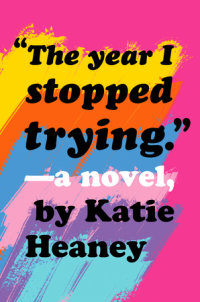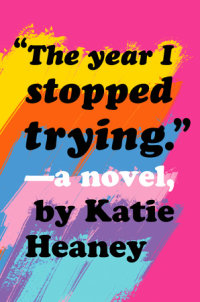The Year I Stopped Trying
Mary never imagined spending her junior year with an existential crisis—but here she is, in this story of overachieving, growing up, and coming out, from the author of Girl Crushed and Never Have I Ever.
Mary is having an existential crisis. She's a good student, she never gets in trouble, and she is searching for the meaning of life. She always thought she'd find it in a perfect score on the SATs. But by junior year, Mary isn't so sure anymore.
The first time, it's an accident. She forgets to do a history assignment. She even crosses "history essay" off in her pristine planner. And then: Nothing happens. She doesn't burst into flames, the world doesn't end, the teacher doesn't even pull her aside after class.
So she asks herself: Why am I trying so hard? What if I stop?
With her signature wit and heaps of dark humor, Katie Heaney delivers a stunning YA novel the sprints full-force into the big questions our teen years beg--and adeptly unravels their web.
An Excerpt fromThe Year I Stopped Trying
The first time was a mistake.
I don’t like to admit that, because I think this whole thing would be cooler if I’d meant to do it from the beginning for some good reason, or even a reason. But the truth is that one day, after ten years without incident, I just forgot.
There wasn’t anything unusual going on that week. I worked my usual shift at La Baguette, got home, did what was left of my homework, watched a little TV, and went to sleep. The next morning I got up, ate the same breakfast, made the same peanut butter and jelly sandwich and put the same chips and carrots in little plastic bags, and drove my brother, Peter, and me the same way to school. I walked into first period three minutes before the bell, completely prepared for another normal day. Then class started, and the teacher asked us to hand in our homework . . . and my stomach fell into my feet. My face burned. I felt faint and dizzy and a little like I might throw up. Because I had not done my AP U.S. history homework. Somehow, in the list of things I had to do the night before, this one had gotten lost. As everyone around me dug through their bags for their short essays on Manifest Destiny, I flipped through my planner and scanned yesterday’s to-do items. And there it was, with a line drawn through it, like everything else on the page. But I had not written that essay. I looked through my folder, just in case, but I knew there was nothing to find.
I sat there, sweating, for the rest of class, planning what I’d say to Mr. Delaney to let him know I knew I’d made a mistake and I’d never do it again if somehow he could find it in him to forgive me. I could offer to do a makeup assignment, a five- or ten-page paper on a topic of his choosing. Or I could pretend I had done the homework but had packed my bag wrong because of unspecified stressors at home. I could say I’d gotten home late from work and set a 4:00 a.m. alarm to finish, but then my phone died, and I was almost late for school. He might believe me and offer me half credit to bring it in tomorrow. I weighed whether the damage to my dignity would be worth it if he did.
Maybe I would just run.
Class ended. I hovered for a few moments over my desk, slowly gathering my belongings, waiting for Mr. Delaney to call me over to explain myself. He had his shirtsleeves rolled up just slightly, revealing powerful-looking wrists and the merest glimpse of a tattoo faded navy. He was a former marine, and the rumor was that under his shirt and slacks he was covered from neck to ankle in tattoos. He loved pop quizzes and had a particular knack for calling on people exactly when they’d decided it was safe to zone out. Once, allegedly, he’d even offered an open-book final, only to retract the open-book part on the day of the exam. Mr. Delaney was not a teacher who could be counted on for grace.
Finally he looked up and saw me there, watching him as the next class’s students started filtering into the classroom. “Yes, Mary?” he said. “Did you have a question?”
“No,” I said automatically. “Sorry.”
“See you tomorrow,” he said firmly, and a little patronizingly. So I turned, and I walked out.
And that was it. After fifty-two minutes of agony and anxiety, my heart rate up and my head woozy and hot, it was over? I wasn’t relieved; I was furious. I consoled myself by thinking he’d hold me after class the next day, after he’d had a chance to go through the essays, but he never handed them back. He just talked about the themes he’d seen, our collective mistakes. At the beginning of class, my shoulders were tensed up near my ears, but the more time passed, the lower they fell, until it felt safe to confirm: I’d gotten away with it. I had failed to turn in homework to the scariest teacher at school, and he didn’t even notice. So what had all that worrying and all that guilt been for?
The next time I didn’t do something, it would be on purpose.
——
Mr. Bartlett, my AP calculus teacher, offers weekly extra credit so everyone doesn’t fail. He assigns the homework, then gives an optional extra page we can do for ten points. You don’t even have to get the answers right—you just have to show you honestly tried, and ten points are yours. For a long time I resented this system, because you could essentially fail the homework and get, like, twenty-seven out of fifty, and if you even half-assed the extra credit, you wound up with a thirty-seven, which is a C.
I rarely needed the extra credit to clear an A, but I did it every week, to get a higher one. With extra credit I’d get fifty-five or sixty out of fifty on my homework, which left me with a running total of something like 110 percent. Which is still just an A, and not even the highest A in the class: Ellen Barnes has 132 percent, because she also gets perfect scores on all the tests, whereas I usually score in the low nineties or, on a bad day, the high eighties. But I figured that if I somehow bombed the final, I’d thank my earlier self for banking all those points. But it didn’t seem all that likely that I’d suddenly fail.
So one week, when Mr. Bartlett offers my class page forty-two of the workbook for extra credit, I just . . . don’t do it. I hand in my assigned pages, and when I get them back the next day (forty-seven out of fifty), Mr. Bartlett has written a little note at the top: No extra credit this week? Next to this he’s drawn a little smiley face, and if I had to pinpoint a trigger that set this whole thing off, I’d choose that stupid, smug, patronizing little smiley face. That smiley face thought it had me all figured out. Oh yeah? I thought. Watch me.
The next time Mr. Bartlett offers extra credit, I don’t do it. Again. This time no smiley face. This time he asks to see me after class.
“I noticed you didn’t do the extra credit again, and I just wanted to make sure everything’s okay,” he says. His brow is furrowed, and he clasps his hands together in concern. He has the hairiest knuckles I have ever seen. I don’t want to be caught staring, but my eyes are drawn back again and again. Little hairs poke out from under his wedding band, and for some reason it’s this part that disgusts me most.
“It’s not required, right?” I ask.
“Well, no.”
“Then I don’t need to do it,” I say.
The look on Mr. Bartlett’s face sends shame radiating down my body. Even my ankles blush. But I stand my ground, and then he shrugs. “Okay,” he says. And I leave.
——
I go home that day expecting an interrogation. I think my transgression should be visible on my face: this is not a girl who bothers with extra credit. But nobody says anything. I linger in the kitchen after setting the table while my mom cooks two dinners: one for herself and one for my dad, my brother, and me. My mom’s latest diet dictates that she not eat anything with seeds, which pretty much just leaves cauliflower, as far as I can tell. I would have thought there were only two, maybe three, ways to eat cauliflower, but my mom has carried on this way for weeks.
“What’s for dinner?” I ask.
“Beef Stroganoff,” she says.
“I meant for you.”
“Just a simple stir-fry,” she says. Her forehead looks sweaty.
“Is that real rice, or—”
“Cauliflower.”
I nod. Linger.
“How was school?” she asks, suspicious.
“Fine,” I say. “I got in trouble for not doing extra credit for calculus.”
“You got in trouble?” She doesn’t even stop stirring.
“Well, my teacher asked me about it.”
“But you still have an A,” she says.
“Yeah.” I shift from one foot to the other, refolding a napkin that doesn’t need it.
“That doesn’t sound like trouble.”
“Yeah, I guess not,” I say. My stomach sinks. She’s right.
——
It isn’t about attention.
Getting good grades, being on time, raising my hand, finishing every available vocabulary book so my teacher has to place a special order just for me—that gets me attention. Or it used to. In middle school, maybe, I was the best and most favored, but I’m not anymore. My practice ACT scores max out at thirty. I’m not ranked in my year’s top-ten students. The last I checked, I was number twenty-one. Out of 423, sure. But still. My GPA is 3.94, largely because no amount of studying can make me understand the practical purpose of math beyond the algebra level, and this attitude shows up in the perfunctory nature of my homework (or so I’ve been told). I’m worse at physics, but at least physics makes intuitive sense: things go up and come back down. I’ve seen this happen.



